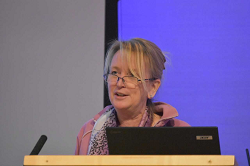The UK-based New Nicotine Alliance (NNA) has called upon the World Health Organization to show leadership in highlighting ‘the considerable public health potential of reduced risk products’.
Speaking today, designated by the WHO as World No Tobacco Day, Sarah Jakes (pictured), chair of the NNA, said that electronic cigarettes comprised a proven safer alternative to combustible cigarettes, and an alternative that many people found to be an acceptable substitute.
“They have contributed to record falls in smoking prevalence in the UK,” she said.
“There have also been big declines in smoking prevalence in France and the USA due to uptake of innovative products, while Sweden and Norway boast by far the lowest smoking rates in Europe thanks to the widespread use of snus, a tobacco product which carries a fraction of the risk of smoking lit tobacco.
“The WHO Framework Convention on Tobacco Control was founded with a commitment to encourage tobacco harm reduction. Its Ottawa Charter and Jakarta Declaration also pledge to put people at the heart of decision-making and to support and enable consumers to keep themselves, their families and friends healthy. Yet these goals appear to have been abandoned in favour of blindly attacking industry, ignoring the global success of alternative nicotine products and refusing to engage with consumers.”
Jakes went on to say that, on World No Tobacco Day, it was time for leadership from the WHO in educating governments that e-cigarettes were not tobacco products as some states wrongly categorised them. It was time to emphasize that it was the act of lighting and smoking tobacco, not the consumption of tobacco in all its forms, that led to heart and cardiovascular disease.
“In 1976, Michael Russell famously said ‘people smoke for nicotine but they die from the tar’, leading to an acceptance of the nicotine replacement therapy market we have today,” she said. “Yet increasingly the public are being misled into believing nicotine is a problem, when it can be a solution.
“World No Tobacco Day should be a great opportunity to raise awareness of far safer alternative nicotine products to maximise benefits to public health worldwide. The WHO should be empowering people to take control of their health by way of clear messages on differing risks and the relative safety of nicotine, but this year they have sadly missed the target.”
Finally, the NNA said it would like to see a greater commitment by the WHO and NGOs ‘to correcting ideological opposition to successful consumer-driven solutions to lit tobacco, and a better recognition of long-term recreational use of nicotine as a powerful incentive for smoking cessation’.
A missed opportunity











